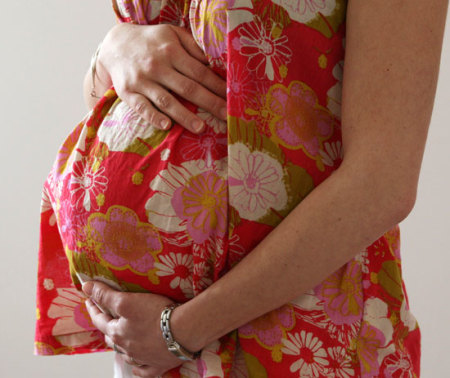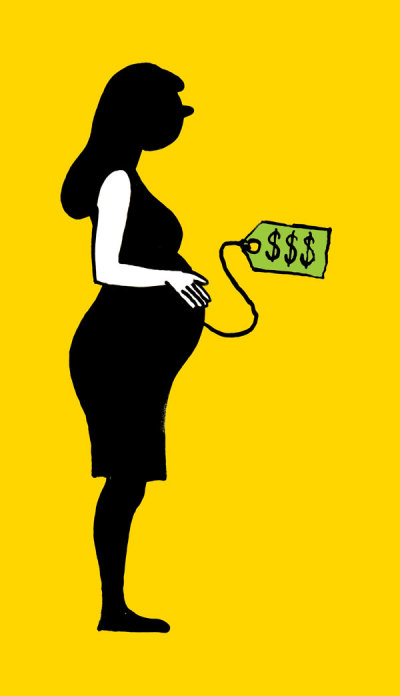Exploitation of Women in Surrogacy Arrangements Exposed in New Documentary Film

Surrogate pregnancies are often portrayed in popular culture as a noble option for couples who are unable to conceive a child but these arrangements are routinely fraught with all kinds of abuses, says bioethicist and documentary filmmaker Jennifer Lahl.
Lahl, president of the Center for Bioethics and Culture Network, worked for 20 years as a pediatric critical care nurse and in hospital administration and has been blowing the whistle on the fertility and surrogacy industries for several years. Soon, she'll be releasing a new film that aims to expose the horrors of commercial surrogacy.
In an interview with The Christian Post on Monday, Lahl shared the story of Kelly Martinez from South Dakota who reached out to CBCN after her last surrogate pregnancy went terribly wrong in almost every possible way.
Martinez found CBCN after having seen some of the group's articles and emailed them in desperation after a couple who hired her to be their surrogate refused to pay her bills and moved back to Spain with the children she had carried to term. Living on a low-income, she didn't have the financial means to hire an attorney to pursue a case against them. She was left saddled with $7,000 in medical expenses and facing financial ruin as creditors called demanding payments.
Martinez's story was so compelling to Lahl she was moved to retell it by making a documentary film about the harrowing experience.
Just days after launching a Kickstarter campaign to raise money to make the film, 100 percent of the funds came in. Lahl and co-director Matthew Eppinette have now set a stretch goal to hire a professional editor and can still accept contributions since 17 days remain in the campaign. Donors who give $1,000 or more will have the opportunity to become an associate producer for the film.

When it comes to the theological implications of surrogacy, Lahl, who self-identifies as a "small-o orthodox Protestant" and has a master's degree in bioethics, noted that in her line of work most religious people are either ignorant of or opt not to bring the teachings of their faith to bear on reproductive technology issues. This is true whether they be Jewish, Mormon, Roman Catholic, or evangelical, she said.
The Church of Jesus Christ of Latter-day Saints and the Roman Catholic Church both adhere to doctrine that explicitly states their opposition to surrogacy. But evangelicals and Mainline Protestants often do not have an authoritative ecclesiastical body articulating a stance.
"But Protestants at least have Scripture," Lahl said.
"I mean, for heavens sake, 'I knit you together in your mother's womb.' Not some nice lady, not some woman you found on the internet who has offered to help you have a baby," she added, quoting Psalm 139:13.
Lahl finds it especially frustrating when she speaks with clergy who never preach on the subject even though infertility issues frequently appear in the Bible. The first mention of a "barren womb" appears in Genesis.
"[Christians] have full permission to speak about how children come into the world. They are gifts, they are blessings," she said.
But the Bible never says that we are somehow entitled to them, she noted, and most people today operate with "shallow theological thinking on the most profound matters of making human life."
"Make no mistake, once we move into the laboratory, we are making children. They are not begotten, they are made. They are manufactured," she argued.
In addition to the ethical questions present regarding when and how life begins, vulnerable women like Martinez are being exploited, she said.
In March, Lahl hosted an event in New York City called "Trading on the Female Body" where Martinez accompanied her and shared her story. They spoke again the following day at the United Nations' Commission on the Status of Women.
Commercial surrogacy is a cause that secular left-wing feminists, women's rights activists, and many Catholic and Christian social conservatives are united against, The Atlantic reported in March.
During Martinez's last surrogate pregnancy she suffered serious health complications and was informed by her doctor that he would need to deliver her twins via C-section or she and/or the babies might die.
"Kelly's story highlights almost everything you can imagine that is wrong with surrogacy arrangements," Lahl says in the Kickstarter video, describing the turmoil Martinez endured. The economic disadvantages visited upon the young women who enter into surrogacy contracts are severe and complicated, and financial transactions often take place across international borders.
"I always say, you'll never see a wealthy Hollywood celebrity offering to be a surrogate for her paid housekeeper," Lahl quipped.
Lahl further noted that underpinning the romanticized view of the practice in culture is a kind of dismissal of the body as part of our very selves.

"We don't have a sort of reverence, if you will, for the dignity of the human body," she said. "We see it as a vehicle, an instrument that we can share, loan out, and let other people borrow."
"And I think we have a fractured view of intimacy in marriage," she added, noting that none of this is new, for even Sarah told Abraham to sleep with Hagar to conceive his child in the Old Testament.
The biblical mandate to be fruitful and multiply has become warped.
"Yes, God tells us to 'be fruitful and multiply,' but not at any cost," she asserted.
Martinez, a three-time gestational surrogate, fits the common profile of a surrogate mother: a young woman who has a financial need and has carried other babies to term, Lahl said, noting that to be a surrogate one has to prove they can get the job done. These women often risk their physical and mental health and future well being for the promise of a sizable financial return.
But legal protections for women when such pregnancies go awry do not exist.
"I think our laws, our public policies, our faithful sensibilities should be to protect a young mother's health and well-being, not exploit her," Lahl said.
Lahl closely monitors the surrogacy debate in the United States and told CP that it's "marching forward" but the states of New Jersey, California and New York have particularly bad surrogacy laws.
"And the church is asleep at the wheel, I'm sorry to say," she lamented.
CBCN's previous films, Eggsploitation and Breeders: A Subclass of Women? have earned praise from leading feminist activists and groups.





















